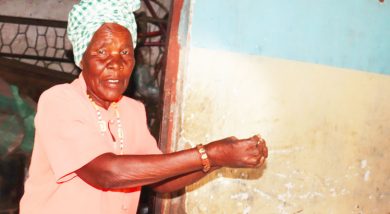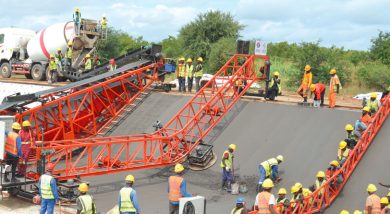Project sparks hope for rural communities
When Tilile Nabanda of Mponda Village in Traditional Authority (T/A)Kaomba in Kasungu got pregnant in 1976, she did not think about the possibility of giving birth to a child with a disability.
However, when the baby was born, Nabanda noticed that its legs were not formed properly.
“No woman expects that to happen to her child. But it is something you do not have control over,” she says.
Nabanda, now in her early 70s, says children—whether born with a disability or not—are precious gifts and must be given the best care a parent can offer.
“Unfortunately for me, I did not have anything to offer my child. We were a very poor family such that we could not even send the child to school,” she recollects.

That child, named Monica Kafantandala, needed mobility assistance to attend school, but the parents could not afford.
At 48 years old now, Monica is a poor, illiterate single mother of two, struggling with the realities of life.
“I wish I were educated. Unfortunately, schools were far away and I could not walk. If only I had a wheelchair, my story could be different,” she says.
Her two children, born in 2000 and 2004, dropped out of school upon reaching Standard 7 due to lack of parental support after their father abandoned them.
“He told me he was going to Lilongwe to look for piecework, and that was it. He never came back,” says Monica.
“So the children have grown up in very difficult conditions. They both just dropped out of school and started doing piecework to support me,” she says.
Monica attributes her family’s impoverishment to the disability that made her unable to get to school.
She is not alone.
Kasungu district social welfare officer Ephraim Njikho says people with disabilities often suffer in silence because they are invisible as they lack exposure.
He observes:
“In most cases, they are confined to their homes and miss out on socioeconomic opportunities.
“When they face challenges like exclusion from socioeconomic activities, they do not come forward. They are invisible and suffer in silence.”
He says there is a need to raise community awareness through advocacy and trainings to help them enjoy their rights on an equal footing with everyone else.
Kasungu District Disability Forum chair Esther Luhana says that in most families headed by a person with a disability, there are high levels of poverty because of lack of education.
She explains: “While there may be some systematic exclusion of people with disabilities in some cases, the major cause of poverty is that most of our members did not get proper education because of their conditions.
“Most of them have not received proper support in terms of education; hence, they live in miserable conditions.”
According to the 2018-2023 National Disability Mainstreaming Strategy, there are over 1.5 million people with disabilities in Malawi, and about 90 percent of them live in rural areas, surviving on subsistence farming.
The International Labour Organisation (ILO) noticed this gap and launched the Sparking Disability Inclusive Rural Transformation (Spark) project to promote the inclusion of people with disabilities.
The Spark initiative aims to ensure that people with disabilities, particularly women and youths, actively participate in and benefit from rural development projects tailored to fit the specific profiles of their disabilities, priority needs, constraints and opportunities.
The two-year project seeks to create and promote employment opportunities for people with disabilities in programmes funded by the International Fund for Agricultural Development (Ifad) in Malawi.
It also aims to expose them to opportunities that are available so that they can live a full and independent life through participation in inclusive socioeconomic activities.
Spark national project officer Vincent Kavala says at least 300 people with all kinds of disabilities have already found opportunities in the Ifad-funded projects, specifically Transforming Agriculture through Diversification and Entrepreneurship (Trade) and Financial Access for Rural Markets, Smallholders and Enterprise (Farmse).
The Trade project supports rural communities in the agricultural production process while the Farmse programme supports household economic development through promoting access to financial services.
Kavala explains: “We are targeting people with any type of disability through a human rights-based approach towards inclusion.
“We understand that people with disabilities face a number of barriers, including attitudes from communities, extension officers, and inaccessible infrastructure, which hinder their participation.
“We have made good strides in that we have over 300 beneficiaries included in Ifad-funded programmes in Kasungu alone, against our target of 428. We are sure by the end of this year we will have reached our target.”
In Kasungu, the project is targeting people with disabilities in T/As Chulu, Chisemphere, Kaluluma and Kaomba. Elsewhere, it is also being implemented in Thyolo, Nkhata Bay and Chitipa districts.
So far, the project has trained 20 disability inclusion facilitators from each of the target districts to provide professional advice on understanding disability and how to make disability inclusion work.
In turn, the facilitators have helped to train Ifad staff on how to include people with disabilities in the various livelihood and agricultural development programmes.
In line with the United Nations Disability Inclusion Strategy, the 2021 ILO Disability Inclusion Policy commits to mainstreaming disability inclusion in its quest to promote decent work for all people, including those with disabilities.
Malawi Council for Disability Affairs (Macoda) manager for Kasungu Wisdom Mseteka says the Spark project has helped to build the capacity of organisations of people with disabilities to enable them to advocate for the needs of their members and offer technical expertise on disability inclusion.
He says: “There are many people with disabilities in the district who live in similar circumstances as Monica’s.
“But we are thankful to ILO through the Spark project for uplifting their lives, giving them the dignity they deserve just like any other person.”
Mseteka says the Spark project has assisted a lot in mobilising people with disabilities, fighting for their inclusion in various community projects and also empowering them.
He stresses: “Through awareness conducted by Spark disability inclusion facilitators, most people with disabilities have joined cooperatives and farmers’ clubs, which is helping to uplift their livelihood.
“And again, as Macoda, through our partnership with the Spark initiative, we have managed to conduct awareness activities through which we have identified people with disabilities and linked them with service providers, especially those that provide assistive devices.”
According to Mseteka, over 131 people with disabilities identified through the project activities, including Monica, have already been assisted with tricycles and crutches to enable them to participate in development activities and conduct businesses that have improved their livelihoods.
Mseteka explains: “We want to see total inclusion, ensure that the right of people with disabilities are respected and recognised at all levels. We do not want them to lag behind.
“People with disabilities must take up positions in the community and whoever is carrying out development initiatives in the community must recognise them by ensuring their involvement.”
Funded to the tune of $230 000 (about K400 million), the Spark project is implemented together with the Ministry of Gender, Community Development and Social Welfare as the policyholder on disability issues.
Furthermore, ILO is also working with the Federation of Disability Organisations in Malawi, Ministry of Labour, Malawi Congress of Trade Union and Employers’ Consultative Association of Malawi at both national and district levels.





